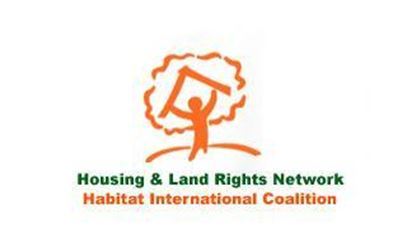
New Delhi, 5 October 2015
On World Habitat Day,
Housing and Land Rights Network (HLRN) proposes that the Indian government—at
the central, state, and local level—adopts a stronger human rights and social
justice approach to housing and habitat issues in the country. The first Monday
of every October is celebrated by the United Nations (UN) as World Habitat Day.
Unfortunately, with the majority of its population living in inadequate
conditions without access to basic services, there is not much for India to
celebrate on this day.
India faces a national shortage of 18.78 million homes in
urban areas and 40 million in rural areas; about 95 per cent of this is for
economically weaker sections. Over two million people are estimated to be
homeless. Census 2011 reports that 13.75 million households live in ‘slums.’
Forced evictions, demolitions of low income settlements, forceful land
acquisition, and displacement in urban and rural areas further exacerbate
poverty, inequality, and the housing deficit. Since independence, about 65–70
million people have been displaced from ostensible ‘development’ projects; the
majority without rehabilitation. HLRN estimates that between January 2014 and
September 2015, at least 28,000 families suffered from forced evictions in
urban areas, resulting in loss of housing, livelihoods, income, health and
healthcare, education, and security.
Several groups face multiple levels of
discrimination with regard to housing and land, especially on intersecting axes
of caste, gender, income, marital status, religion, and age. These include
women, children, Dalits/Scheduled Castes Scheduled Tribes/adivasis, older
persons, minorities, homeless and landless persons, internally displaced
persons, migrants, and persons with disabilities. Their needs and concerns must
be prioritized in all laws, policies, schemes, and programmes related to
housing and land.
According to Shivani Chaudhry, Executive Director, HLRN: “In
order to achieve the commendable goal of ‘housing for all by 2022,’ the
government should adopt the human rights framework of adequate housing;
identify the most marginalized constituencies; set annual targets for delivery;
prevent evictions and real estate speculation; develop rights-based indicators
to assess progress; and incorporate principles of gender equality,
non-discrimination, and sustainability. Instead of introducing market-driven
schemes, the state should work towards a national law on adequate housing for
rural and urban India. In order to increase global respect and strengthen its
presence on the international stage, India needs to fulfil its national and
international human rights commitments.”
India is also being monitored
internationally on its housing and land commitments. The recently adopted
Sustainable Development Goals, which India is mandated to implement, include
targets on reducing inequality, eliminating poverty, and making human
settlements inclusive, safe, and sustainable. In October 2016, the UN Housing
and Sustainable Urban Development Conference (Habitat III) will take place in
Quito, for which India is to submit a report on the status of implementation of
the Habitat Agenda (1996). For its next Universal Periodic Review (UPR) in
January 2017, the government needs to report to the UN Human Rights Council on
the situation of human rights in the country, including progress made in
implementing recommendations from its last UPR (2012). With its multiple
commitments and with the world watching closely, it is important that the
Indian government adopts strong measures to improve housing and living
conditions across the country. Mere slogans and budgetary announcements for
schemes are not sufficient. State accountability, transparency, financial
monitoring, and active participation of people, are required. For durable
solutions, urban and rural issues need to be viewed along the same continuum
and policy response developed accordingly.
The human right to adequate housing
is upheld in international law and has been interpreted by the Supreme Court of
India as an integral part of the right to life. World Habitat Day is an
occasion for India to reaffirm its commitment and take concerted action towards
the realization of the human rights to adequate housing and land for all. Let
India take the lead, this World Habitat Day, in meeting its obligations to its
people and to the international community.
For more information, call:
+91-11-4054-1680 / +91-9818-205234 or write to: contact@hlrn.org.in HOUSING AND
LAND RIGHTS NETWORK, G–18/1 NIZAMUDDIN WEST, NEW DELHI – 110013 www.hlrn.org.in